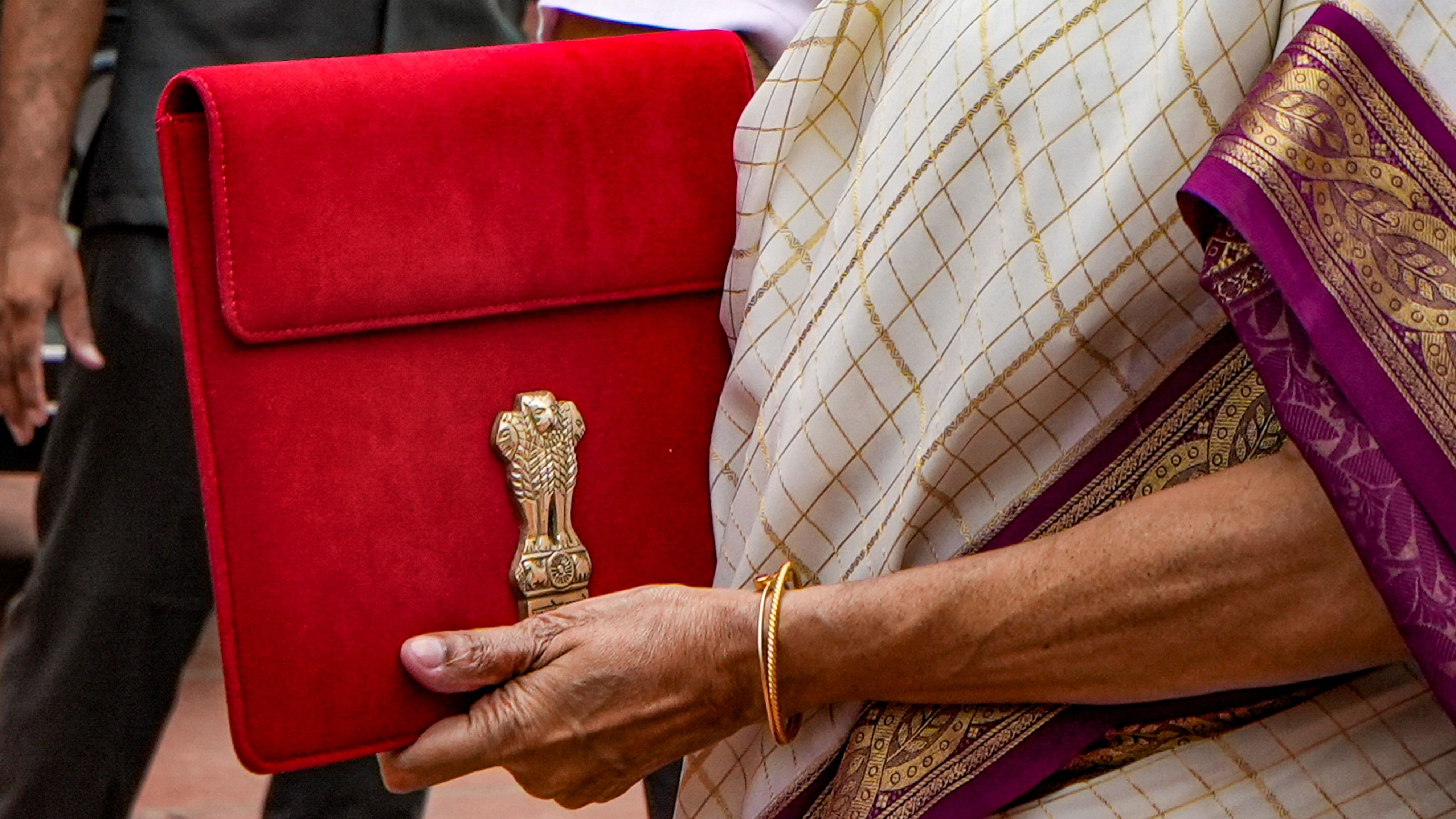
Union Finance Minister Nirmala Sitharaman with a red pouch carrying the Budget documents.
Credit: PTI File Photo
The Union Budget 2024-25 prioritises employment and skilling as a key focus area. It aims to provide skill development training and create employment opportunities for 4.1 crore people over the next five years. The outlay has been pegged at Rs 2 lakh crore.
“Never before have we heard the finance minister in her budget speech emphasising so much about skilling, entrepreneurship, and education,” said Jayant Chaudhary, Minister of State (Independent Charge) for Skill Development and Entrepreneurship. “She (Finance Minister Nirmala Sitharaman) started with it. She referred to it in the middle of the speech, and she concluded with it,” he added, underlining the importance given to employment and skill development in the budget.
Sitharaman’s July 23 budget speech mentions employment 34 times and skilling or skill development 24 times. “In this budget, we particularly focus on employment, skilling, MSMEs, and the middle class,” she said in Lok Sabha
While skill development and employment related announcements have been made in the previous budget speeches also the prominence given to these two issues in this year’s budget seems unprecedented.
Instead of single schemes or programmes, the finance minister has announced a package of five schemes and initiatives to facilitate employment and skilling. Together these schemes and initiatives have been referred to as “Prime Minister’s package for employment and skilling”.
“The package is holistic and comprehensive. It is interlinked with end-to-end solutions,” Prime Minister Narendra Modi said while addressing a post-budget conference organised by industry chamber CII. The prime minister said that the government is highly focused on skill development and employment keeping in mind Industry 4.0 standards.
Out of the proposed Rs 2 lakh crore central outlays on skill development and employment over the next five years, more than half, or Rs 1.07 lakh crore, will be spent on three schemes, which are broadly focused on formalisation of employment through Employees’ Provident Fund Organisation (EPFO). Rs 23,000 crore will go as a direct benefit transfer as one month's salary, up to Rs 15,000, to first-time employees registered in EPFO.
An amount of Rs 52,000 crore is earmarked for facilitating bulk hiring of first-timers in manufacturing. Through this scheme, the government will provide incentives to both employees and employers as per their EPFO contribution. Rs 32,000 crore will be spent on providing reimbursement to employers up to Rs 3,000 per month for 2 years towards their EPFO contribution for each additional employee.
The fourth scheme of the package is related to facilitating youth for internships in top 500 companies. The government plans to spend Rs 63,000 crore on the internship programmes. One crore youth in the age group of 21-24 years are expected to benefit from this scheme. Another Rs 30,000 crore is planned to be spent on upgradation of 1,000 Industrial Training Institutes (ITIs).
Jaideep Kewalramani, Head Employability Business and COO, TeamLease EdTech, said the increased involvement of the industry is likely to make the initiative more effective. “Though more clarity is required on how the top 500 companies for the internship programme will be selected, what will be the sectoral mix etc, but clearly there is a big change. This is the first time the industry will be participating,” Kewalramani said.
Kewalramani added that the work integrated degree programmes would be a great way to integrate industry and academia for driving employability.
Achievements under skill development initiatives have been far from satisfactory. The first National Policy on Skill Development was notified in 2009 under the Manmohan Singh-led UPA government. Just around a year after taking charge Prime Minister Narendra Modi-led government came up with a new National Policy on Skill Development and Entrepreneurship. The new policy notified in July 2015 replaced the policy of 2009.
Modi demonstrated his keenness for skill development shortly after taking charge of the Raisina Hills office. It was evident from the creation of a dedicated ministry called the Ministry of Skill Development and Entrepreneurship. Pradhan Mantri Kaushal Vikash Yojana (PMKVY) was launched in 2015 as a flagship scheme of the ministry. The scheme has two components – short-term training and recognition of prior learning. Four versions of the PMPVY scheme have been launched so far.
The short-term training courses run under the first three versions of the scheme were linked with placements. As per the scheme guidelines, at least 70% of the candidates who took training should have got jobs. However, the numbers tell a different story. Out of 56.88 lakh candidates who got certified in short-term courses, only 21.36 lakh got jobs and 2.94 lakh are counted as self-employed. This means over 57% of the candidates did not get any job, as per the official data.
Placement has been delinked from PMKVY 4.0, the current version of the scheme under implementation from FY 2022-23 onwards. In fact, over 50 lakh candidates who enrolled for the different versions of the PMKVY dropped out. Out of the total 1.66 crore enrollment only 1.15 crore have been certified.